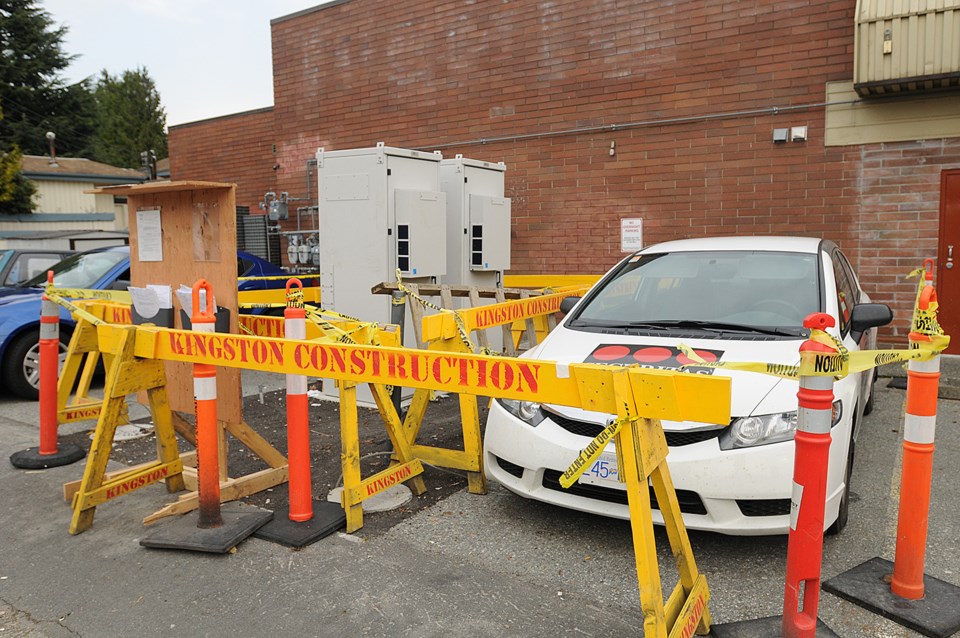Construction work on a new Telus telecommunications tower behind a mini-mall at the corner of Oak Street and W. 49th Avenue is moving forward after nearby residents agreed to stop preventing workers from accessing the site.
On Monday, the telecommunications giant filed an injunction application in B.C. Supreme Court to stop people from blocking workers from the site at 6469 Oak St. but called it off after protesters gave notice they were throwing in the towel.
“It was adjourned after Telus learned from some of the residents that there would be no further illegal blocking of the site,” said Telus spokesperson Liz Sauvé. “We are proceeding on the assumption that we will be able to complete construction… Telus does not intend to pursue any further legal action as long the residents do not block our access to the site.”
The legal move came after staff were prevented from working at the site by four protesters Oct. 18, several months after work on the construction on the 15-metre monotower was put on hold for more public consultation after residents collected 800 signatures on a petition objecting to the project.
The construction site now has security guards keeping on eye on the location around the clock, and copies of Telus’s injunction application threatening legal consequences for public interference are available on a nearby sheltered notice board.
Sauvé believes many residents changed their minds about the project after attending public consultations over the summer.
“The dialogue that we’ve had with residents has been really great,” she said. “We had material both in English and in Mandarin as well for a few of the residents. They were reading the guidelines from Health Canada and understanding the information they had previously been given, whether it was by other residents or something they found online, was misinformation. There is a lot of misleading information out there if you google cell towers.”
She added that Health Canada’s Safety Code 6 (SC6) limit for the maximum exposure levels to RF is some of the strictest in the developed world, and Telus’s injunction notice included an affidavit statement by Patricia Daly, Vancouver Coastal Health’s chief medical health officer, dismissing potential health risks posed by the tower.
“In light of the current scientific understanding of the risks of RF exposure to the public, the installation of base stations and cellular antennae in the community do not pose an adverse health risk and SC6 provides an appropriate level of protection,” Daly wrote.
Sita Walia, an urban designer involved with the group No Telus Tower, doesn’t think the public consultations changed the minds of many of her neighbours and that protesters are instead giving up out of fear of doing legal battle with a deep-pocketed corporation.
Kevin Hart, whose wife Michelle was the only protester mentioned by name in the Telus injunction application, declined to comment when contacted by the Courier.
“It’s almost like they’ve left us no choice unfortunately,” said Walia. “I don’t want to say anything that might make Telus do things against us. People have given up.”
Walia said the verdict is still out in other parts of the world regarding acceptable radiation levels and pointed out that the Vancouver School Board instituted stricter guidelines than Health Canada’s by not allowing towers to be built within 305 metres (1,000 feet) of school property. She admitted that decreased property values are also a major concern for residents.
“The location of towers in the past, they usually try to hide it, whether it is in trees or behind larger building and this is just a one-storey commercial building, so people in the area are worried about their property values going down and their views being blocked as well as health effects.”
Sauvé said, if anything, property values might even go up thanks to the tower, which will double as an electric car charging station.
“I’m not a real estate agent but I would only assume that having good service in an area would be desirable for potential homebuyers, particularly when you look at the safety ramifications.”
Telus estimates that around 2,300 calls are dropped each week in the area due to degraded coverage and Sauvé said this poses a greater health risk if people are unable to contact emergency services.
“We were in contact with emergency services and recently they’ve come out and said 60 per cent of all phone calls to 911 these days come through from cellphones. People need to be able to call 911 and not be facing having dropped calls.”



